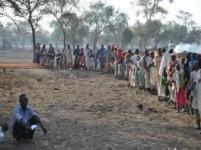 Improving water, sanitation and hygiene is a proven public health intervention in preventing cholera in the refugee camps; the mass vaccination campaign represents a pre-emptive strategy to support these effortsA mass oral cholera vaccination campaign was successfully conducted for refugees in Maban Country in South Sudan by the WHO pandemic and epidemic disease programme in two phases from the end of December 2012 to the second week of February 2013. The campaign was part of a pre-emptive strategy to prevent cholera among an estimated 160 000 refugees who fled to South Sudan from its neighbouring country Sudan as a result of ongoing conflicts in the Region.
Improving water, sanitation and hygiene is a proven public health intervention in preventing cholera in the refugee camps; the mass vaccination campaign represents a pre-emptive strategy to support these effortsA mass oral cholera vaccination campaign was successfully conducted for refugees in Maban Country in South Sudan by the WHO pandemic and epidemic disease programme in two phases from the end of December 2012 to the second week of February 2013. The campaign was part of a pre-emptive strategy to prevent cholera among an estimated 160 000 refugees who fled to South Sudan from its neighbouring country Sudan as a result of ongoing conflicts in the Region.
These refugees are currently living in five camps in Maban and Pariang counties of South Sudan. The refugee camps (Jamam, Genderasa, Doro, Yusuf Batil and Yida) are stretched to maximum capacity and have limited water, sanitation and other basic services. The overall health and hygiene situation among the refugees is precarious with very high malnutrition rates, increased trend of epidemic prone diseases, flooding and poor access to safe drinking-water.
Considering that the risk of cholera in these refugee camps were high given the poor hygiene, water and sanitation situation prevailing, the Ministry of Health of the Government of South Sudan planned to introduce a two-dose oral cholera vaccine (OCV) in four refugee camps (Jammam, Gendrassa, Yusuf Batil and Doro) in Maban County of Upper Nile State of South Sudan.
The use of OCV is considered as a supplementary strategy to prevent cholera outbreaks and also to accrue greater “public health benefits” for the host populations should an outbreak of cholera occur in the refugee camps. Moreover, the use of OCV is not regarded as a replacement for proven public health interventions such as improving the water, sanitation and hygiene situation in the camps.
The overall coverage of the first round in the camps was 92% while the vaccination coverage achieved during the second round of the campaign was 89.4%. This was first ever pre-emptive vaccination campaign with OCV in refugee camps.
Related links
Read more on the oral cholera vaccination campaign [pdf 306kb]


